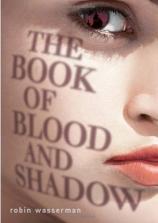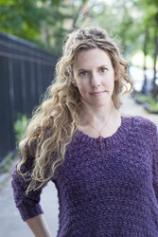Excerpt
Excerpt
The Book of Blood and Shadow

1
I should probably start with the blood.
If it bleeds it leads and all that, right? It’s all anyone ever wants to know about, anyway. What did it look like? What did it feel like? Why was it all over my hands? And the mystery blood, all those unaccounted-for antibodies, those faceless corkscrews of DNA--who left them behind?
But beginning with that night, with the blood, means that Chris will never be anything more than a corpse, bleeding out all over his mother’s travertine marble, Adriane nothing but a dead-eyed head case, rocking and moaning, her clothes soaked in his blood, her face paper white with that slash of red razored into her cheek. If I started there, Max would be nothing but a void. Null space; vacuum and wind.
Maybe that part would be right.
But not the rest of it. Because that wasn’t the beginning, any more than it was the end. It was--note the brilliant deductive reasoning at work here--the middle. The center of gravity around which we all spiraled, but none of us could see. The center cannot hold, Max liked to say, back when things were new and quoting poetry seemed a suitably ironic way to declare our love. Things fall apart.
But things don’t just fall apart. People break them.
2
In the beginning was the Book.
“Seven hundred years old.” The Hoff slammed it down so hard the table rattled. “Imagine that.”
Apparently noting our lack of awe, he dropped a liver-spotted fist onto the book with nearly as much force. “Do so now.” He swiveled his head to glare at each of us in turn, neck veins bulging with the effort. “Close your eyes. Imagine a scribe in a dark, windowless room. Imagine his quill, scratching across the page, transcribing his secrets--his God, his magic, his power, his blood. Imagine, for just one moment, that you will be the one to reach across the ages and make this manuscript yield its treasure.” He drew a baby-blue handkerchief from his breast pocket and hocked a thick wad of phlegm into its center. “Imagine what it might be like if your sad, small lives were actually worth something.”
I closed my eyes, as ordered. And imagined, in glorious detail, the tortures I would impose on Chris as soon as we escaped from this musty dungeon of mad professors and ancient books.
“Trust me,” Chris had said, promising me a genial old man with twinkling grandfather eyes and a Santa laugh. The Hoff was, according to Chris, a bearded marshmallow, hovering on the verge of senility, with little inclination to force his research assistants to show up on time, or, for the most part, show up at all. This was supposed to be my senior-year gift to myself, a thrice-weekly escape from the ever-constricting halls of Chapman Prep into the absentminded bosom of ivy-covered academia, a string of lazy afternoons complete with snacking, lounging, and the occasional nap. Not to mention, Chris had pointed out as my pen hovered over the registration form, “the opportunity to spend quality time with your all-time favorite person, otherwise known as me.” Not that this was in short supply, as his freshman dorm was about a hundred yards from my high school locker. The only problem with the dorm was having to put up with the presence of his roommate, who resolutely kept himself on his side of the room while keeping his owlish eyes on us.
And now that same roommate stared at me from across the table, the final member of “our intrepid archival team.” Another detail Chris had conveniently neglected to mention. Chris assured me that Max didn’t intend to be creepy, and was, when no one else was watching, almost normal. But then, Chris liked everyone. And his credibility was slipping by the minute.
The Hoff--Chris had coined the nickname last year, when he’d been the one whiling away his senior year with the get-out-of-jail-free pass commonly known as supervised independent study--passed around the Book. “Decades’ worth of experts have tried to crack the code,” he said as we flipped through page after page of incomprehensible symbols. More than two hundred pages of them, broken only by elaborate illustrations of flowers and animals and astronomical phenomena that apparently had no counterparts in the real world. “Historians, cryptographers, mathematicians, the NSA’s best code breakers gave it all they had, but the Voynich manuscript refused to yield. Mr. Lewis!”
We all flinched. The Hoff snarled, revealing a mouthful of jagged teeth, sharp as fangs and--judging from his expression--soon to be applied to a similar purpose. “That is not how one handles a valuable book.”
Max, who had been rifling through the pages like it was a flip-book, rested his hands flat on the table. Behind his glasses, his eyes were wide. “Sorry,” he said quietly. Aside from the soft “Hi” I’d gotten when we were introduced, it was the first time I’d heard him speak.
I cleared my throat. “It’s not a valuable book,” I told the Hoff. “It’s a copy of a valuable book. If he ruined it, I’m sure he could scrounge up the twenty bucks to pay you back.”
The real thing, with its crumbling seven-hundred-year-old pages and fading seven-hundred-year-old ink, was safely ensconced in a Yale library, eighty miles to the south, where faculty didn’t have to settle for high-school-age researchers or cheap facsimiles. The Hoff closed his eyes for a moment, and I suspected he was putting his own imagination to the test, pretending away whatever scandal had stripped him of his Harvard tenure and dumped him here to rot at a third-rate college in a third-rate college town for the rest of his academic life.
Thanks, Max mouthed, an instant before the Hoff opened his eyes and resumed his glare.
“All books are valuable,” the professor said. But he didn’t press it.
I decided the roommate wasn’t so bad when he smiled.
The meeting lasted for another hour, but the Hoff gave up on his dreamlike rambling and instead stuck to logistics, explaining his significant research and our minimal--“but absolutely essential!”--part in it. He’d just weaseled a collection of letters out of some wealthy widow, and was convinced they contained the secret to decoding the Book. (It was always the Book when he spoke of it, capital B implicit in the hushed voice, and we followed suit, ironically at first, then later out of habit and grudging respect.) Max and Chris would be put to work indexing and translating the bulk of the collection, searching for clues. I, on the other hand, was assigned a “special” project all my own.
“Most of the letters are written by Edward Kelley,” the Hoff explained. “Personal alchemist to the Holy Roman emperor. Many believe he authored the Book himself. But I believe his contribution is both lesser and greater. I think he got his hands on it, and solved it. And now we will follow in his footsteps.” He pointed at me. “Ms. Kane.”
“Nora,” I said.
“Ms. Kane, you will deal with the letters written by Kelley’s daughter, Elizabeth Weston, which seem to have found their way into the collection by mistake. I doubt they contain anything of use, but nonetheless, we must be thorough.”
Unbelievable. I could translate twice as fast and three times as accurately as Chris could, and if the Hoff had even bothered to glance at my Latin teacher’s recommendation, he’d know it. “Is this because I’m a woman?”
Chris snorted.
“I can take the Elizabeth letters if Nora doesn’t want them,” Max said. “It’s okay with me.”
Thank you, I would have liked to mouth, returning the favor, but the Hoff was watching. And his face was a storm cloud. “I mind. This kind of work requires a certain . . . maturity. Elizabeth’s letters will give Ms. Kane ample practice in historical translation while the two of you help me with the real search.”
Admittedly, if you’d asked me five minutes earlier, I would have said I didn’t care whether I was translating important letters, pointless letters, or a sixteenth-century grocery list. But then the Hoff opened his big, fat, sexist, ageist--whatever -ist was conscribing me to uselessness--mouth.
“So it’s because I’m in high school?” I added. “You know, it’s not fair to judge me based on--”
“Do you want to be a member of this team or not, Ms. Kane?”
I could have enlightened him on the difference between want and need, as in wanting to be at Adriane’s house mopping up her latest micro-drama, or in Chris’s dorm room watching TV (or at least trying to, while pretending not to notice Chris and Adriane making out behind me and Max doing his spook stare from across the room), basically wanting to be anywhere else, but needing the credits for graduation and the bullet point for my college applications.
“I do, Professor Hoffpauer.”
“Good.” He stood up and, with stiff, awkward contortions, folded himself into a bulky wool topcoat. “The collection will be waiting here for you tomorrow afternoon. Christopher has a key to the office and will show you proper document-handling protocol.”
“The archive’s not being housed in the rare-books library?” Max asked.
“As if I’d let that harpy get her hands on these?” the Hoff said. He narrowed his eyes. “Not a word to her about this. Or to anyone, for that matter. I won’t have someone taking this away from me. They’re everywhere, you know.”
“Who?” Max asked. Chris just shook his head, knowing better.
“Young man--” The Hoff lowered his voice and leaned toward Max, casting a shadow across the Book. “You don’t want to know.”
It was a close call, but we managed to hold our laughter until he was out of the room.
Excerpted from THE BOOK OF BLOOD AND SHADOW by Robin Wasserman. Copyright © 2012 by Robin Wasserman. Excerpted by permission of Knopf Books for Young Readers, a division of Random House, Inc. All rights reserved. No part of this excerpt may be reproduced or reprinted without permission in writing from the publisher.
The Book of Blood and Shadow
- Genres: Fiction, Historical Fiction, Historical Mystery, Historical Thriller, Mystery, Suspense, Thriller, Young Adult 12+
- hardcover: 448 pages
- Publisher: Knopf Books for Young Readers
- ISBN-10: 0375868763
- ISBN-13: 9780375868764




